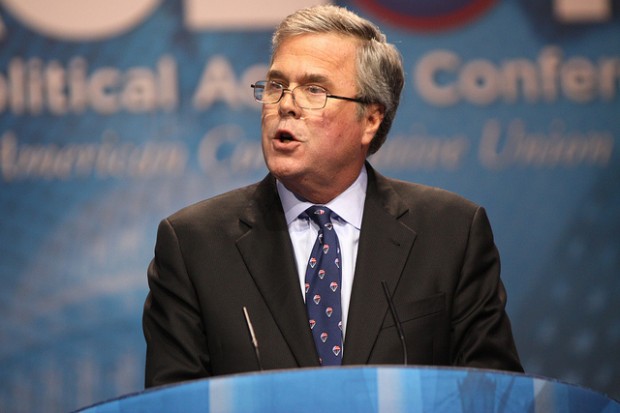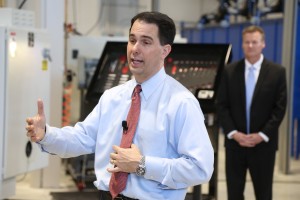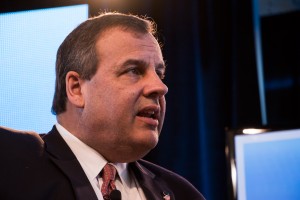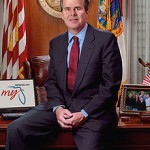How Jeb Bush’s Education Record Will Change The 2016 Republican Primary
Former Florida Gov. Jeb Bush is expected to become a Republican presidential candidate Monday.
Education has been a signature issue for Bush. He helped start Florida’s first charter school. He says schools and teachers should be judged on student performance. He pushed for vouchers for private schools.
And he spent most of his time since leaving the Florida governor’s office advocating for his brand of school reform.

Gage Skidmore / Flickr
Former Governor Jeb Bush of Florida speaking at the 2013 Conservative Political Action Conference (CPAC) in National Harbor, Maryland.
Bush will ensure education is a top issue in the 2016 presidential race. But he’s not the only candidate with a strong record on schools.
“You have a roster of candidates that are quite strong on this issue from the Republican side,” said Michael Petrilli, president of the Thomas B. Fordham Institute, a conservative education think tank which generally supports Bush’s version of education reform.
“It did not get much airtime in 2008 or 2012 and I think it’s going to be different this time around. And for those of us that care about education and schools, I think that’s a good thing. It’s better to have the country engaged on these issues.”
Bush is the 800-pound gorilla in the GOP field. His family has already produced two U.S. presidents. He has been raising tens of millions over the past few months as he explores a presidential bid. And he has an 8-year record as Florida governor.
To talk about how education will affect the race for the Republican presidential nomination in 2016, you first have to go back sixteen years.
It’s when Bush, then Florida’s governor, convinced lawmakers to pass his A+ Plan for education.
Bush — with a little sarcasm — described the plan shortly after its approval to the Manhattan Institute, a New York City think tank
“Another wacky idea in 1999 in America,” Bush called it.
The plan was built on three ideas:
Set high goals for students.
Hold schools accountable for poor performance, and reward those which succeed.
And expand school choices for parents and students.
Today, Bush’s “wacky idea” has become a blueprint for Republicans across the country. Even President Obama, a Democrat, has praised Bush’s ideas.
“There’s no doubt that Jeb Bush’s reforms in Florida became a national model,” Petrilli said. “In my opinion, for good reason. That model showed great success in Florida – that kids in Florida made huge gains.”
Education was the issue Bush turned to as he began flirting with a possible presidential candidacy. In February, he spoke at a summit hosted by the non-profit advocacy and research group he founded, the Foundation for Florida’s Future.
Bush held firm on a central tenet of the A+ Plan — test, and use those results to punish and reward — even as opposition to testing was rising across Florida and the country.

Sammy Mack / StateImpact Florida
Former Gov. Jeb Bush visited a Hialeah charter school for National School Choice Week in 2014.
“I think if you don’t measure, you don’t really care,” Bush said. “I think you have to assess where students are.”
But Bush has already learned that talking about education at the state level is very different than talking about education at the federal level.
Petrilli says things Republicans might vote for in a gubernatorial candidate can turn them off in a presidential race.
“Republicans are always of two minds,” he said. “Republicans, on the one hand, very much support education reform. But they also support a limited federal role in education.”
Here’s an example. In 2012, then-Texas Gov. Rick Perry felt so strongly about eliminating the federal department of education that it was the agency he could remember despite struggling to name the other two agencies he would axe.
Standards outline what students should know at each grade — and usually draw little attention from the public.
Common Core has the support of many Republicans and the business community.
But Common Core became a rallying cry on the right after President Obama encouraged states to adopt the standards in order to receive millions in federal grants. They believed it was another example of the federal government using money to impose its will on states.
They also argue the new standards aren’t as good as what some states were already using.
“And this is where it gets tricky,” Petrilli said. “I think you’re going to hear Republicans talking about some of these ideas: school choice, higher standards as something they support.
“But, when asked very directly, ‘What would you do as President?’ You’re mostly going to hear about giving power back to the states.”
Few have promoted Common Core as much as Bush. Petrilli says Bush will have to talk about education in a way that doesn’t make voters think “Big Government.”
At his February education summit Bush never spoke the words “Common Core.” But he sketched out what Washington’s role should be.
“I think it has to be pretty clear that the federal government’s role ought to be to enhance reform at the local and state level, not to impose it – because that doesn’t work,” Bush said. “And I think there should be prescriptions on what they can’t do and what they shouldn’t do.”
According to Bush, that includes encouraging the use of specific standards, curriculum or tests.
But while Bush’s support for Common Core will turn off some Republican voters, he’s also given the GOP ideas on education that voters like.
The Fordham Institute’s Petrilli says that means Bush isn’t the only likely candidate who can brag about his or her record on schools.

Gateway Technical College / Flickr
Governor Scott Walker Visits Gateway's SC Johnson iMET Center on Tuesday, March 18, 2014
“You have a roster of candidates that are quite strong on this issue from the Republican side,” he said.
Wisconsin Gov. Scott Walker, another Republican exploring a possible White House run, earned national attention when he pushed through a law stripping teachers of their right to collectively bargain. He also let workers choose whether to pay dues to the union.
Teachers protests filled the capitol in Madison for days.
“I took away the gravy train they had before and gave that right back to the workers to make that decision,” Walker said in a 2012 interview.
And in New Jersey in 2010, after Gov. Chris Christie asked teachers to take a pay cut to help balance the state budget.
Christie said he asked Jew Jersey teachers to freeze their pay for one year and to contribute 1.5 percent of their salary toward their health benefits for those who didn’t contribute already.

iprphotos / Flickr
New Jersey Governor Chris Christie at the inaugural Ag Summit in Des Moines. 3/7/2015. Photo by John Pemble.
Christie is also thinking about a presidential run.
Yet another possible GOP candidate, Ohio Gov. John Kasich, has supported Common Core and pushed to improve his state’s charter schools.
Petrilli says so many potential GOP candidates have a strong record on schools that education will be a much more important this primary. The economy in poor shape and conflicts around the globe dominated the past two election cycles.
Petrilli says the split will be most pronounced between the governors and the Senators and other members of Congress running for President. Governors are used to having more control over education decisions, he said. While members of Congress — Kentucky U.S. Sen. Rand Paul or South Carolina U.S. Sen. Lindsey Graham — will emphasize the limits to what a president can and can’t do with federal education policy.


